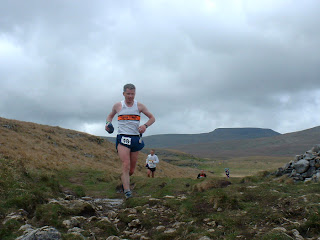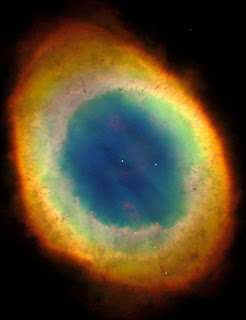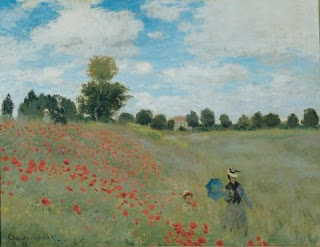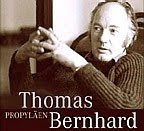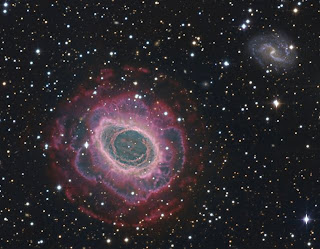Regular visitors to Poet-in-Residence may see this blog post chopped and changed as events unfold, for synchronicity is a riddle the answer to which could be hidden just about anywhere.
If synchronicity takes you by the hand you ought sometimes to follow, if only to see where it leads you. Often it leads you to somewhere or something absurd. A silly coincidence. It has no meaning that you can deduce. But now and then the end of the trail will surprise and inform, for it will have led you to somewhere illuminating.
I begin with a definition of synchronicity:
synchronicity: the temporal coincidence of two or more events linked together by meaning, but without any causal connection; meaningful cross-connection between separate causal chains (Trans. of G
synchronizität; used by C G Jung (Webster))
The story begins when I was leaving the Thomas Bernhard exhibition. There's a post below about all that. Before long I found myself rummaging in a banana box of bargain books. I chanced upon a paperback book called
Those Feet, which I thought might make a suitable present for a football crazy friend of mine. And so I bought it.

[image courtesy of findagrave.com]
The original post began here:
David Winner, in the introduction to his book
Those Feet - an intimate history of English football (Bloomsbury) tells a strange story. Here's an extract:
'Those Feet' are the third and fourth words of William Blake's sublime, exalting poem 'Jerusalem' [...] The book's original title had been 'By God They Frighten Me', from the Duke of Wellington [...] Mike Jones and I met to thrash out the question, and it didn't take us long to agree that Blake's line had more going for it than the acid wit of the Iron Duke.
The following day [...] exploring a part of London I didn't know [...] on a whim, I got off the bus [...] the only interesting thing in sight was a small park [...] I became aware of birdsong and greenery and trees covered with blossom, but I paid little attention to anything else [...] After a couple of hundred yards [...] I stopped. I looked down, and found that I was standing beside the grave° of William Blake.William Blake was the first poet to speak for children in their own right, in their condition of innocence. For Blake, love was innocence; spirituality released from materialism. Churches and chapels belonged to
The Beast, the State. His attitude to death was captured in this comment on the death of his friend Flaxman:
I cannot think of death as more than going out of one room into another.
Blake said of the following poem:
I may praise it since I dare not pretend to be any other than the secretary; the authors are in Eternity.
Blake's poem relates to the persistent legend in parts of Britain, including Wales, that Joseph of Arimathea, the wealthy Israelite who provided the tomb for Christ, departed Judea and sailed for Britain with a small fleet of ships containing some 500 followers (including Jesus himself). It is said that a group of these followers eventually settled in the Glastonbury area.
The Welsh prefix
Glas (remember that Cymraeg or Welsh was spoken widely, in fact it was spoken in 2/3rds of Britain in those days) means
heaven,
sky,
blue. According to the legend, Joseph of Arimathea thrust his staff into the earth and it miraculously sprouted white flowers, perhaps it was hawthorn, and so he came to choose Glastonbury as the place to be.
Maybe Blake was right? He certainly believed that he was. And he could be, for when I look at the boundary of the Roman Empire there was practically nowhere else that Joseph of Arimathea and his followers could travel to.
In the east there was desert and the client state of Arabia-Petraea. In the south the Romans controlled the provinces of Egypt (including Alexandria), Cyrenaica, Africa (including Carthage) and the client state of Mauretania. In the west Roman rule extended from Judea over the breadth of Europe to Lusitania in present day Portugal. And in the north, Roman power extended as far as the Rhine, Belgica and Gallia Lugdunensis (present day Northern France) and included the client state of Thrace on the Black Sea. The strategic and important cities of Antioch, Pergamum, Ephesus, Corinth, Actium, Rome, Lugdunum and Gades were in Roman hands.
Clearly with the Romans in control of almost all of Europe's roads and cities a land route was out of the question. A group of 500 travellers would immediately arouse suspicion. The roads were already lined with thousands of wooden crosses. The way out of Judea would have to be by sea and Brittania, which would not fall to the Romans until 43 AD, was at the time immediately following the crucifixion the safest destination for Joseph and his followers.
The Holy Grail, it has often been argued is only a code name for Jesus. This was probably an idea that Blake had mulled over time and time again. After all, as a ten-year old he had already seen
one hundred sparkling angels sitting in a tree.
According to diarist Henry Crabb Robinson, the poet William Wordsworth thought Blake was a madman, but a madman whose work he preferred to the likes of Lord Byron and Sir Walter Scott. That aside, Blake likely believed that the
King Arthur and the Holy Grail legend was rooted in the much older
Joseph of Arimathea and the Holy Grail legend. He would then have deduced that the two legends were in essence two parts of one legend and then it followed that he could produce the following:
from
Introduction to MiltonAnd did those feet in ancient time
Walk upon England's mountains green?
And was the holy lamb of God
On England's pleasant pastures seen?
And did the countenance divine
Shine forth upon our clouded hills?
And was Jerusalem builded here
Among those dark satanic mills?
Bring me my bow of burning gold:
Bring me my arrows of desire:
Bring me my spear: O clouds unfold!
Bring me my chariot of fire.
I will not cease from mental fight,
Nor shall my sword sleep in my hand
Till we have built Jerusalem
In England's green and pleasant land.
But what has all this to do with synchronicity. This is mildly interesting but in the end pure coincidence surely?
Please be patient dear reader, we are far from finished yet ....
And so, when I first drafted this post and had just finished typing the above poem from Blake's
Introduction to Milton, I discovered much to my surprise that today, of all days, in the year 1674 was the poet John Milton's supposed death day. Milton had made his peace with himself and the world, declined to attend church, refused to allow any religious services to be held in his house and then quietly passed away in his bed, aged 66. It was so peacefully done that
his expiring was not perceived by those in the room. He was buried in St. Giles' Church at Cripplegate in London.
[to be continued]
[continued]
A few words about John Milton at this point:
By 1651, at the age of 43 or so, Milton was blind. He believed that he had lost his sight by writing treatises in defence of freedom of the press and the English people. He wrote in his sonnet xxii that he had lost his eyes
over-plied in liberty's defence. A true martyr to the cause.
And now back to synchronicity. We have followed the links in the chain from the Thomas Bernhard Exhibition in Vienna to a nearby shop and a book about football, and then from there to a graveyard in London and the poet William Blake. Synchronicity then took us from the world of Blake to the world of John Milton and his death on this day exactly 335 years ago.
But there's one more step, and that is via Nicholas Albery's
Poem for the Day book where I found the text of the William Blake poem. This book is nothing less than Poet in Residence's bardic bible. And so, looking at today's entry, which is of course a poem by John Milton, I am forced to the conclusion that this was the whole purpose and point of the strange synchronous chain we have followed in this blogpost. It was intended, was it not, to bring me, and you, to this page dated 8th November and to this poem, this message, which I now share with you the reader:
Sonnet xixWhen I consider how my light is spent
Ere half my days in this dark world and wide,
And that one talent which is death to hide
Lodged with me useless, though my soul more bent
To serve therewith my Maker, and present
My true account lest He returning chide;
'Doth God exact day-labour, light denied?'I fondly ask. But patience, to prevent
That murmur, soon replies,
'God doth not need
Either man's work or his own gifts. Who best
Bear his mild yoke, they serve him best. His state
Is kingly: thousands at his bidding speed,
And post over land and ocean without rest;
They also serve who only stand and wait.'Of course, the bold text is mine. And that is done so that I must now ask myself: Where am I in the end, the end of the chain, the end of the journey and what is the message? Where have I arrived as the result of synchronicity? What is the information I must take on board? Is it that Zen Buddhism is just as valid as anything else? That there is no need for us to bomb our way to the tabernacle or to the black meteorite. In fact, as the poem hints, such fanatical behaviour is pointless. The blind man sees best. That's it. That's the information. End.
___________
John Milton (9th December 1608 - 8th November 1674)
William Blake (28th November 1757 - 12th August 1827)
°The location of William Blake's final resting place (see photo) is Bunhill Field Cemetery in the East of London. But, like Mozart in Vienna, the exact location of the great man's bones is unknown. The approximate spot was only rediscovered in 1965.
